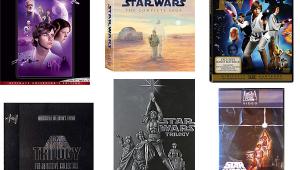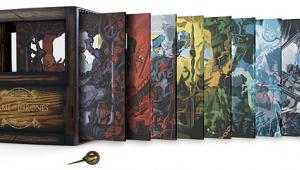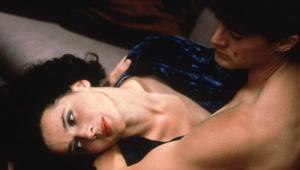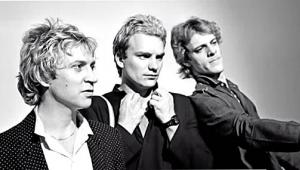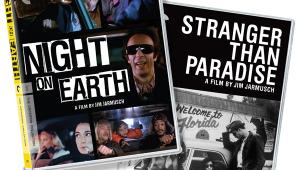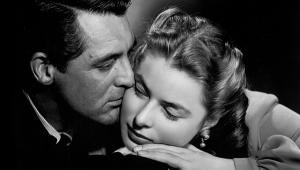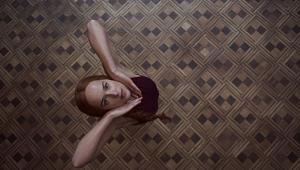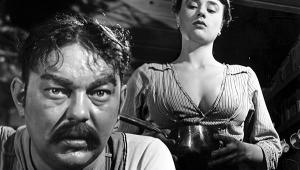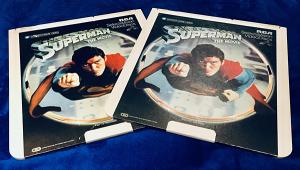Chicago
Picture *** 1/2
Sound ****
Film ****
Chicago tells the story of two women who commit murder, and who, through the help of a clever lawyer, not only escape justice but are able to use their notoriety to become successful in show business. As the basis of a musical, this is a long way from the earnestness of Oklahoma!, South Pacific, or, for that matter, Rent. But while Chicago might be accused of benefiting from exactly the sort of cynicism it is ostensibly providing an exposé of, it's dazzling entertainment, with a superb score by Kander and Ebb and some great performances. Chicago received 13 Oscar nominations in 2002, winning six, including Best Picture.
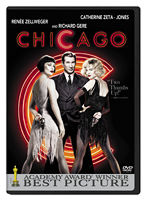 Adapting the original stage version of Chicago to cinematic form presented some major challenges. (Bob Fosse, who directed the original, himself toiled over a movie adaptation, and finally gave up on it.) On Broadway—and in the many revivals that continue to attract audiences—Chicago told the story through a set of theatrical/vaudeville numbers performed on stage, the stage intended to be seen as a stage rather than as a stand-in for real life. To preserve this highly stylized theatrical convention within the inherently more realistic medium of the cinema, the idea that director Rob Marshall came up with was that these numbers take place in the imagination of chorus girl and would-be star Roxie Hart. While not entirely original—the British TV series The Singing Detective and Kander and Ebb's own The Kiss of the Spiderwoman immediately come to mind—the device is executed here with such conviction and flair that it's impossible to resist. There are some very clever touches, like the way the flashlight that the police shine in Roxie's face as she's being interrogated becomes the spotlight for her onstage appearance as she sings "Funny Honey." Much of the credit for the effective juxtaposition of the worlds of reality and imagination must go to film editor Martin Walsh (Oscar for Best Film Editing), who maintains a crackling pace without following the fast-cuts-for-the-sake-of-fast-cuts approach of Moulin Rouge!
Adapting the original stage version of Chicago to cinematic form presented some major challenges. (Bob Fosse, who directed the original, himself toiled over a movie adaptation, and finally gave up on it.) On Broadway—and in the many revivals that continue to attract audiences—Chicago told the story through a set of theatrical/vaudeville numbers performed on stage, the stage intended to be seen as a stage rather than as a stand-in for real life. To preserve this highly stylized theatrical convention within the inherently more realistic medium of the cinema, the idea that director Rob Marshall came up with was that these numbers take place in the imagination of chorus girl and would-be star Roxie Hart. While not entirely original—the British TV series The Singing Detective and Kander and Ebb's own The Kiss of the Spiderwoman immediately come to mind—the device is executed here with such conviction and flair that it's impossible to resist. There are some very clever touches, like the way the flashlight that the police shine in Roxie's face as she's being interrogated becomes the spotlight for her onstage appearance as she sings "Funny Honey." Much of the credit for the effective juxtaposition of the worlds of reality and imagination must go to film editor Martin Walsh (Oscar for Best Film Editing), who maintains a crackling pace without following the fast-cuts-for-the-sake-of-fast-cuts approach of Moulin Rouge!
The choices of Renée Zellweger as Roxie (who shoots her lover when he dumps her and tells her that he never intended to make her a star) and Catherine Zeta-Jones as Velma (who kills her sister and husband when she finds them in bed together) were inspired. Roxie is a character who could easily be disliked: completely self-centered, not above offering herself to men if she thinks this will be to her benefit—and she is, after all, a murderess. Zellweger communicates the narcissism and toughness that is at the core of the character, but this is tempered by her own sweetness and vulnerability, so that we want Roxie to get away with murder and become a star. While not a trained dancer or singer, she acquits herself splendidly in both areas (sounding not unlike Bernadette Peters), keeping up with her more experienced co-star. Catherine Zeta-Jones is, of course, one of the great beauties of the cinema, and she got her start in musical theater, playing the lead in 42nd Street for three years on the West End while still in her teens. She is completely in her element here, singing and dancing like the pro that she is. Like Zellweger, she infuses the character with her own persona, so that, once again, we want to see her onstage rather than in jail. She received the Best Supporting Actress award, beating out Queen Latifah, who has great fun in the role of the Sophie-Tuckeresque Mama Morton. John C. Reilly, another Oscar nominee, is Roxie's sad-sack husband, Amos; his "Mr. Cellophane" is one of the movie's highlights. As Billy Flynn, the lawyer who has never lost a case, Richard Gere has some minor musical-theater experience in his background, and while he's not as good a singer as Jerry Orbach, the role's originator, he sings and moves well enough, and captures Billy's slickness and charm.
Chicago's cinematography features a lot of high-contrast theatrical lighting, the backgrounds often fading into darkness. Owners of DLP and LCD projectors might be tempted to increase the black level to compensate, but this is not a good idea: the backgrounds are not intended to be seen. Some of the images have a deliberately grainy quality, but the picture quality is otherwise excellent, and so is the sound. I did some comparison of the Dolby Digital and DTS soundtracks, and although my initial preference was clearly for the DTS, switching back and forth between the soundtracks revealed that the comparison was not quite fair, in that the DTS soundtrack was significantly louder and the bass was boosted. To compensate, I reduced the DTS volume and bass to more nearly match Dolby Digital. The apparent sonic advantage of DTS almost disappeared in this better-controlled comparison, DTS sounding perhaps just a bit more open and detailed.
Extras include the obligatory "Behind the Scenes" featurette, interspersing clips from the movie with interviews where people talk about what fun they had and how great everyone was. What is more interesting is the commentary track by Rob Marshall and screenwriter Bill Condon. They point out aspects of the film that have their effects almost subliminally, and Marshall is refreshingly candid in admitting that he had to
reshoot several scenes because they didn't work as he had intended. Best of all the extras is "Class," a number cut from the film, performed with world-weary perfection by Zeta-Jones and Latifah. As Marshall explains, "Class" was cut not because there was anything wrong with the performances, but because, in the end, he decided that it was not true to the songs-in-Roxie's-imagination concept. Now, that's what I call class.—RD


